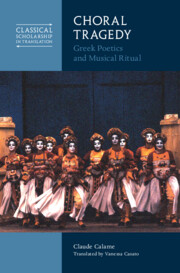Book contents
- Choral Tragedy
- Classical Scholarship in Translation
- Choral Tragedy
- Copyright page
- Dedication
- Contents
- Foreword
- Preface to the English Edition
- Note on the Translations
- Methodological Prelude
- Chapter 1 The Essence of ‘The Tragic’
- Chapter 2 Tragedy, Cult and Ritual
- Chapter 3 Choral Polyphonies and Tragedy
- Chapter 4 Aeschylus’ Persians
- Chapter 5 Euripides’ Hippolytus
- Chapter 6 Sophocles’ Oedipus Tyrannus
- Chapter 7 Poets, Tragic Diction and Tragic Fiction
- Bibliography
- Index of Names
- Subject Index
Chapter 2 - Tragedy, Cult and Ritual
Published online by Cambridge University Press: 25 April 2024
- Choral Tragedy
- Classical Scholarship in Translation
- Choral Tragedy
- Copyright page
- Dedication
- Contents
- Foreword
- Preface to the English Edition
- Note on the Translations
- Methodological Prelude
- Chapter 1 The Essence of ‘The Tragic’
- Chapter 2 Tragedy, Cult and Ritual
- Chapter 3 Choral Polyphonies and Tragedy
- Chapter 4 Aeschylus’ Persians
- Chapter 5 Euripides’ Hippolytus
- Chapter 6 Sophocles’ Oedipus Tyrannus
- Chapter 7 Poets, Tragic Diction and Tragic Fiction
- Bibliography
- Index of Names
- Subject Index
Summary
In the wake of German Romantic aesthetic thought, Greek tragedy was appropriated by idealist philosophy as a basis for theories of the Tragic. This resulted on the one hand in a positive ontology that led, by way of tragic reversal, to man’s absolute conscience and freedom, and on the other hand in a negative ontology in which human nature’s fundamental indeterminateness eludes language. In this perspective, Greek drama acts as a salutary reminder that human reality eludes Enlightenment reason. A historicized version of these idealist theories of the Tragic, greatly influenced by Christian theology around divine Incarnation and Redemption, finds expression in recent work by various scholars; by staging divine men who suffer and gods who are all too human, Attic tragedy as a genre is held to refer to a ‘minimal theology’ based on the effects of time and animated by a ‘theoretical need’ that is instrumental rather than final; it presents on stage a series of paradoxical individualities. By relying on a template, it enables singular dramatic situations to ‘make sense’.
- Type
- Chapter
- Information
- Choral TragedyGreek Poetics and Musical Ritual, pp. 21 - 63Publisher: Cambridge University PressPrint publication year: 2024



